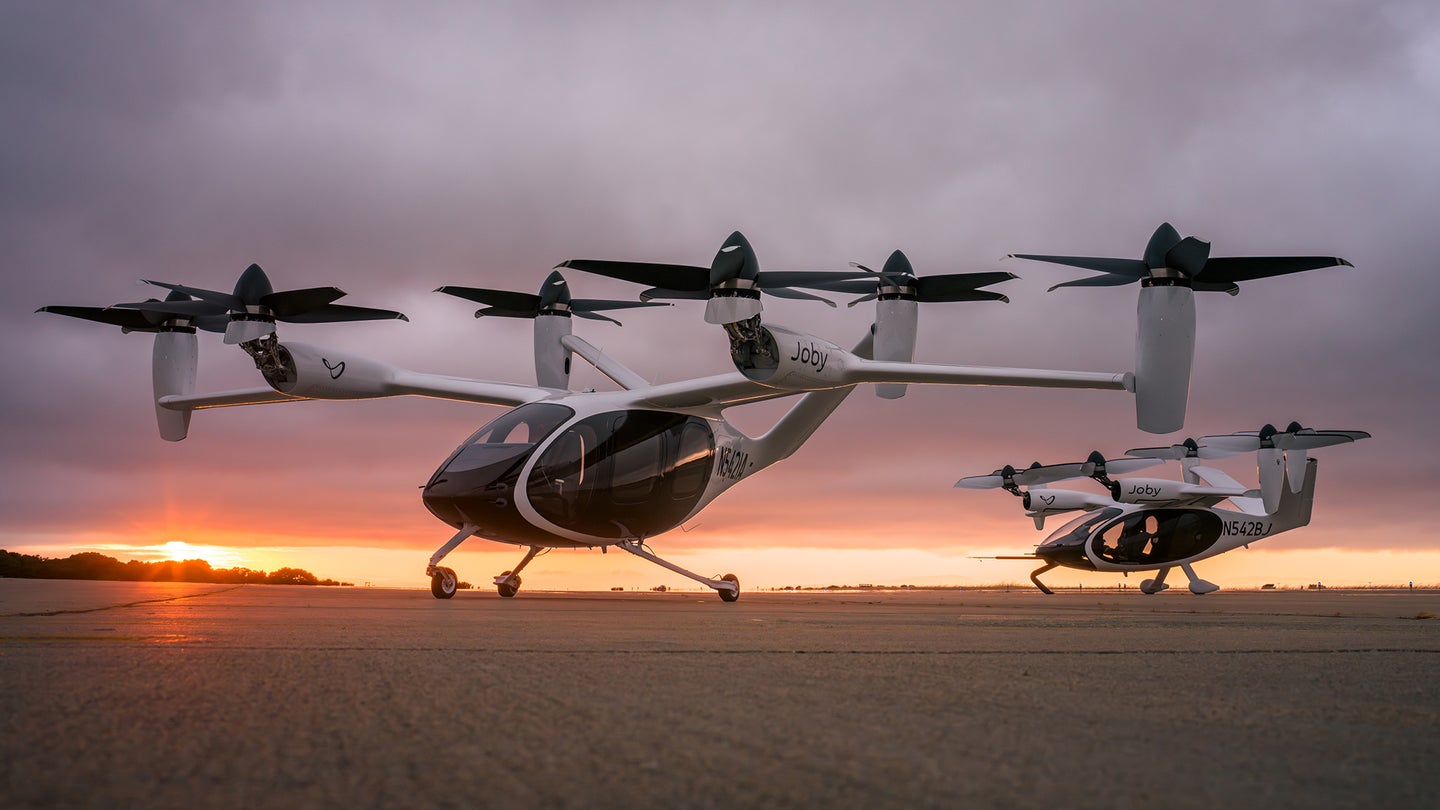Joby’s latest electric air taxi will head to an Air Force base for tests in 2024
The new aircraft, which is designed to take off and land vertically, is the company's first production prototype. Take a look.

Small planes have one propeller, bigger ones have two, and helicopters have a giant rotor on top and a smaller one on the tail. Then there’s an electric aircraft from Joby Aviation, which has a whopping six propellers. They can all tilt to allow the flying machine to take off and land vertically, or cruise in forward flight.
The California-based company, which has been developing electric air taxis for years, officially took the wraps off its first production prototype aircraft today. It looks similar to pre-production aircraft that the company has flown before, but this one is destined to be delivered to Edwards Air Force Base in California after Joby finishes testing it. “We have the approval to fly that plane now legally, and we will fly it very soon,” says Jon Wagner, a veteran of Tesla who is the company’s lead for the powertrain and electronics team. That FAA certification to fly the plane, which has the word “experimental,” written on its side, is not the same type of certification that the company needs to fly paying customers. That comes later, if all goes according to plan.
The schedule holds for Joby to bring the aircraft to the Edwards Air Force Base in 2024, but the company will conduct tests that include flying it before sending it to the military base. “We expect very, very soon it will be in the air,” Wagner says. “We’ll be flying it in Marina [California] here, and then it will be moved to Edwards, and complete its official flight test plan with the US Air Force as a partner.”
Joby Aviation and other electric aviation companies like Beta Technologies have a relationship with the Air Force through a program called Agility Prime. The purpose behind this program is for the military to help out the companies working in the field, while also learning from the tech and exploring how it could help the military. In a press release, Joby said after the aircraft arrives at Edwards, “it will be used to demonstrate a range of potential logistics use cases.”
“We’re super excited about taking this aircraft to Edwards Air Force Base in California to begin testing with the DOD,” the company’s CEO, JoeBen Bevirt, told Bloomberg News. “That is just a spectacular opportunity for us to begin building the operational muscle and begin moving goods and people around military airbases before we have FAA certification.”
Joby’s production aircraft could be a way to transport cargo or people someday; it can hold four passengers, plus a pilot. The company’s goal is to carry people beginning in 2025. “I believe what we’re showing here is going to revolutionize aviation forever,” Wagner says. Joby also has a planned collaboration with Delta Air Lines, which could provide a way for passengers to make a short hop from somewhere in the New York City area, for example, to John F. Kennedy International Airport, before embarking on a regular plane to someplace further away.
Wagner says that the production aircraft that they’ve just unveiled appears, superficially, to resemble the pre-production aircraft the company has fabricated already. It “looks substantially similar to the very first aircraft we built, six years ago,” he says, “and especially [similar] to the last two aircraft we built.”
But he says that even if it looks similar, the flying machine that came off the production line has been subjected to iterations to improve it. “The biggest difference is that we’ve now invested in the manufacturing systems, and we can make multiple of these aircraft, over and over now, and that’s because we’ve gained the confidence in that design,” he says.

The industry as a whole has seen setbacks, as has Joby. A company called Kitty Hawk, which was working on a single-seat self-flying aircraft, closed its doors last year. And, an uncrewed, remotely piloted aircraft from Joby crashed in February of 2022, after it “experienced a component failure over an uninhabited area near Jolon, California,” the NTSB said in its preliminary report. “There were no injuries, and the aircraft was substantially damaged.” Plus, earlier this month, NASA said that it wouldn’t fly its electric X-57 plane, due to safety concerns and time constraints.
In the US, Joby’s competitors include Beta Technologies, Archer, and Wisk, which is owned by Boeing.
Take a look at the sleek new aircraft, below:
